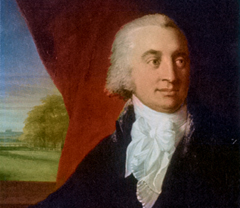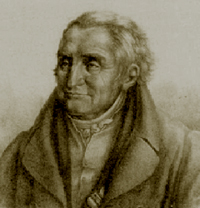Caspar Voght
Caspar Voght (* November 17, 1752 in Hamburg, † March 20, 1839 ibid ), since 2 May 1802, Caspar Empire Baron Voght ( mostly contemporary Baron Caspar Voght of ), was a German merchant, Hanseat and social reformer.
Together with his business partner and friend of Georg Heinrich Sieveking, he led one of the largest trading houses of Hamburg in the second half of the 18th century. On numerous journeys he crossed the whole of Europe. Among his greatest achievements the reform of the poor and the Hamburg prison system is one in 1788. Since 1785, he increasingly devoted himself to agricultural and landscaping projects and built in Flottbeck near Hamburg an agricultural estate on.
- 3.1 sources
- 3.2 representations
Life and work
Origin, Youth and Grand Tour ' through Europe
Caspar Voght was the first of three children of the Hamburg merchant and later senator Caspar Voght ( the elder, * 1707 † 1781 Beverstedt near Bremen in Hamburg) and the Hamburg senator's daughter Elisabeth Jencquel ( born September 26, 1723). The Bremen preacher Johann Vogt and Vogt Wolbrand were his uncle. His father had entered 1721 as an apprentice in the trade house Jürgen Jencquels and specialized in the Hamburg Portugal Trade Company had represented from 1732 for sixteen years in Lisbon. After his return had Voghts father own, founded on linen and silk trade specialized trading company in Hamburg and later rose to the Senate of the Hanseatic city.
At the age of twelve years, Caspar Voght difficult ill of smallpox and was henceforth drawn by eye-catching smallpox scars. Unlike his friend Georg Heinrich Sieveking, whom he met as a teenager in his father's office, he felt his life more to literature, politics and science and was attracted to the profession of a merchant bring only little. As wanted to send to study in Lisbon by his father at the age of twenty years, he used sent his mother, who had in the great earthquake of Lisbon in 1755 lost two of her brothers, the fears, and went 1772 instead on an educational trip through Europe ( ' Grand Tour' ). His path led him among other things, Amsterdam, London, Paris and Cádiz to Madrid, where he established new business contacts for the company of his father. About the South of France, he traveled on to Switzerland, where he met Lavater and Haller and made in Ferney, near Geneva, the acquaintance of Voltaire. About Turin, Milan, Parma and Bologna, he came to Rome, where he Pope Pius VI. was presented. After a side trip to Pompeii, Naples and a short stay in Venice Voght traveled to Bergamo, where he established contacts with the local silk manufacturer for his father's business. About Vienna, Dresden, Berlin and Potsdam he finally returned in 1775 to his home city of Hamburg returned.
Love with a married businessman wife Magdalena Pauli
No later than 1777 Voght fell in love with the sister of his closest friend Piter Poel, Magdalena Pauli, born Poel (1757 - 1825). She returned the affection for the Hanseatic League formed. In 1801 she settled by the sober businessman Adrian William Pauli ( 1749-1815 ) divorced his wife she had been since April 14, 1776. Even after his death, she did not marry her passionate lover Voght; it remained at a friendly relationship. - Voght was a worshiper Magdalena Paulis a successor of the Hessian- checkout metallic Kammerjunker Heinrich Julius von Lindau; Charlotte Louise Ernestine, born of Barckhaus called Meadow Cabins (1756 - 1821), afterwards (since 1784) Noble of Oetinger since her marriage to Eberhard Christoph Ritter and Noble Oetinger, was once again in winter 1775/1776 as a successor unattainable beloved Lindau of nearly the same age Magdalena Poel shortly before their marriage. She was a sister of the later Hesse-Darmstadt urban State Minister Carl Ludwig von Barckhaus called meadow huts and the painter Louise of Panhuys, born of called of meadow huts Barckhaus. Dazuhin she was a model for the fictional character of "Miss B.. " In Goethe's epistolary novel The Sorrows of Young Werther ".
Trading activity and structure of the Musterguts in Flottbeck
On the death of Caspar Voghts the Elder in 1781 Voght led together with Georg Heinrich Sieveking father's business under the name " Caspar Voght and Co. " on. Together, they took advantage of the independence of the former British colonies to build solid business relationships with trading houses in the ports of the North American east coast. The dated on March 29, 1783 official congratulatory letter of the Hamburg Senate to Congress of Philadelphia brought Johann Abraham de Boor, a Hamburg citizen, " Caspar Voght & Co. " traveled overseas on behalf of the trading house.
However Voghts interest was more agricultural than the merchant profession. Even in his youth he had been excited for the designed by a French landscape gardener garden of his father in Hamm. When he realized in later years that his penchant for landscape architecture and horticulture was more than a hobby and business life repel increasingly started it ( known shortly before his death Voght in a letter: "As the Trade my imagination could no longer deal he disgusted me " ), he left the management of the trading company mostly his business partner Sieveking. From 1785 Voght began with the purchase of land in small Flottbeck before the suburb of Altona. After a trip to England in the winter 1785/86, where he had become familiar with the local landscape architecture and modern for its time farming methods, he started on his hamburger lands the construction of a model farm and a nursery ( ornamented farm, a landscape garden with agricultural use - today Jenischpark made his parc du midi). He has also taken the Scot James Booth and the Frenchman Joseph Ramee two nurseryman of European rank after Flottbeck. 1787 led Voght potatoes, which had been imported until then mainly from the Netherlands, as a crop. In 1797 he supported his manager Luke Andreas Staudinger in setting up a " farmer Tific Education Institute " in upper - Flottbeck, the first agricultural college in Germany. The most prominent students of this institution was Johann Heinrich von Thünen, who corresponded with later Voght especially on issues of soil statics ( = soil fertility ).
Voght as a reformer of the arms being
Already in 1770 Voght had come to the prison system in contact, as he had led the English prison reformer John Howard on behalf of and as the representative of his father by the Hamburg prison. Since then, he had a great interest in questions of the poor and the prison system. Together with the Head of the Commercial Academy Johann Georg Büsch and the jurist Johann Arnold Günther Voght initiated in 1788 the establishment of a "General poorhouse " and reformed so that the Hamburg poor relief. Basis of the reform was the division of the city into various maintenance districts whose inhabitants were supported by more than 200 volunteer nurses arms. The establishment of guaranteed medical care for the poor, their support during pregnancy and childbirth as well as instruction and work for the children of the poor. In contrast to the previously operated under moral and ethical aspects of ecclesiastical poor relief continued the reform on to the specific economic needs of those affected. The cost of the company were applied from donations from churches and weekly arms collections. As a result, the number of occupants of the Hamburg penitentiary dropped drastically.
Voghts successes in the fight against poverty seemed far beyond Hamburg. 1801 called him Emperor Franz II to Vienna to reports from Voghts measures and to make proposals for a reform of the Vienna arms being. For his services he gave Voght the title of baron and raising him to the peerage. During a stay in Berlin in winter 1802/ 03 Voght wrote at the request of the Prussian King Friedrich Wilhelm III. Opinion on the Berlin poor relief. Created in the course of a stay of several months in Paris in 1807 by order of the French Ministry of the Interior opinions on the state of the Parisian poor, orphans and childbirth and jails. He also reformed the Poor Relief in Marseille and Lyon and sent his reform concepts to Lisbon and Porto. Even at the age of 86, he gave in 1838, the fiftieth anniversary of the Hamburg poorhouse, a pamphlet entitled " Collected from the history of poor children during their 50 years of life " out.
The late years
Already in 1793 Voght had with the exception of trade with America ceded all business to his partner Sieveking. The commercial crisis that shook Hamburg in 1799, and his company met heavy, so he had to subsequently lead to the resolution of the trading company, which went on for several years, decide.
During the period of the Continental System, he undertook again a multi-year journey through Switzerland, France and Italy. Here he met in Paris, Emperor Napoleon and know his first wife Josephine. After his return to Flottbeck he lived mainly on the income from his farming. After the sale of Musterguts to the banker and Senator Martin Johann Jenischhaus in 1828 he lived in his house, and later he lived with the widow of his deceased business partner in 1799 Georg Heinrich Sieveking. His son Karl Sieveking, who wanted to transform his country seat in 1829 acquired Hamm into a model by model Flottbeker, Voght discussed here as well as in the establishment of the napping house.
On March 20, 1839 Caspar Voght died at an old age at the age of 86 years. He was buried at the cemetery Nienstedtener in Hamburg. His tomb is located at the entrance to the cemetery on the Elbchausee.
Others
After Caspar Voght two hamburgers streets were named: The Baron- Voght -Straße in small Flottbeck and the Caspar- Voght -Straße in Hamm. Also in Hamm was the former secondary school Caspar Voght, in whose building now houses the Ballet School of the Hamburg Ballet. Recently, a school has been designated in Rellingen to him.










